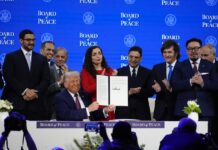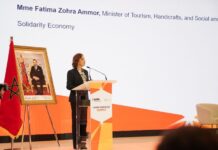In an era where digital transformation is reshaping global economies, artificial intelligence (AI) emerges as a strategic tool in Morocco. From commerce and urban planning to finance, this cutting-edge technology is unlocking unprecedented potential to tackle contemporary challenges while paving the way for sustainable, inclusive, and resilient ecosystems.
In the world of commerce, AI is already leaving its mark, particularly in promoting Morocco’s rich artisanal heritage. Using advanced analytics, traditional crafts like pottery, ceramics, and jewelry are gaining newfound visibility on digital platforms. By analyzing consumer preferences and predicting market trends, AI empowers artisans and businesses to refine their marketing and sales strategies.
The rise of e-commerce and the global appeal of the “Made in Morocco” brand are a testament to this transformation. Moroccan artisanal products frequently appear in millions of online mentions, bolstered by AI-driven insights. This digital surge not only amplifies global demand but also preserves the authenticity of these age-old crafts, ensuring their legacy thrives in modern markets.
Rapid urbanization in Morocco has spurred a growing demand for smarter, more connected cities. AI lies at the heart of this transition, enhancing urban infrastructure and streamlining transportation systems.
Sophisticated algorithms now analyze traffic patterns, significantly improving network efficiency and reducing congestion. Similarly, technologies like QR codes and digital payments simplify transactions while fostering transparency. These innovations go beyond addressing current urban challenges—they actively reduce cities’ ecological footprints, aligning with sustainability goals.
By integrating AI-driven solutions, Moroccan cities are not only preparing for the future but also setting an example for other African nations facing similar urban challenges.
AI is proving indispensable in modernizing Morocco’s financial systems. From real-time fraud detection to process automation and low-code solutions, these advancements enhance flexibility and bolster the competitiveness of Moroccan financial institutions on both regional and global stages.
Moreover, digital transformation in banking has a deeper mission: financial inclusion. Tools such as e-wallets and cashless payment systems are opening economic doors for unbanked populations, enabling their participation in the digital economy.
To realize AI’s full potential, Morocco must ensure digital accessibility for all. This involves building robust infrastructure, expanding internet access, and fostering financial literacy. These initiatives are critical in a society where cash transactions remain dominant.
AI in Morocco represents more than just technological innovation—it embodies a broader vision of economic efficiency intertwined with social inclusion. If current efforts continue, AI could become the cornerstone of Morocco’s sustainable development and global competitiveness in the coming years.





